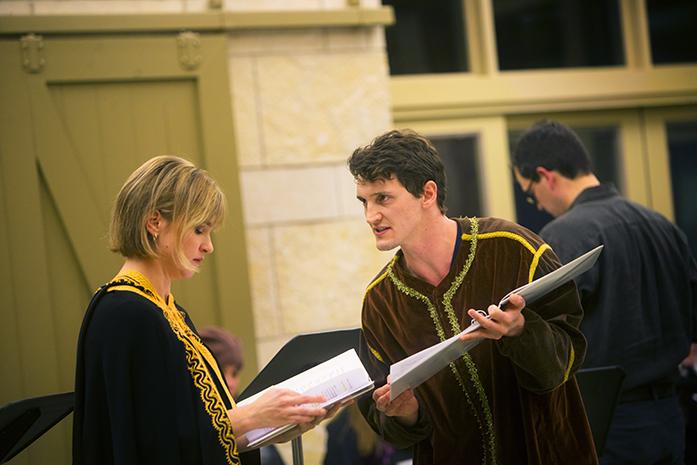Some in the Iowa City community responded to the inauguration with social commentary and protest.
By Naomi Hofferber
In a divisive post-inauguration environment, the Iowa City community held events of unity, protest, and solidarity throughout the weekend.
On the night of Jan. 20, a company of professional actors, community members, and a former city councilor joined for a production of Richard III in response to the inauguration of President Trump.
Ron Clark, a cofounder of Riverside Theater and the director of the production, had worked on a shortened script of Richard III for a production at St. Ambrose University when Tara McGovern, a local musician and friend, called for a post-election production of the show.
“Richard III is Shakespeare’s perfect megalomaniac,” Clark said. “He will do anything, say anything, lie, do whatever it takes to get the power that he desperately wants, that he desires. It seemed to me that we’re looking at an incoming president with similar characteristics.”
Clark said the production was also a call for action, and the production provided a list of organizations people can contact for direct political involvement. It also raised money for the American Civil Liberties Union.
“[Theater] is an amazing format for conversation,” Clark said. “People love to talk about issues that are presented to them in a thoughtful way, like dramatic work. It is like peering into a different life before you, in order to create a reality that is present right now. It’s a great bridge to thought, and conversation, and action.”
On the morning of Jan. 21, women from all over the nation participated in Women’s Marches that took place in various cities across the United States. Corey Hickner-Johnson, a UI doctoral candidate and graduate instructor, couldn’t travel to the marches in Washington, D.C., or Des Moines, so she started her own in Iowa City.
“This is where I live, this is where I teach, this is where I’ve made my home right now,” she said. “Let’s do something here for people like me who can’t be traveling right now but wants to protest against hate.”
Hickner-Johnson said her cause for marching was to take a stand against a hateful rhetoric sparked by Trump.
“For me, it’s about saying I want to build a country that’s based on equity and equality and life, liberty, and the pursuit of happiness and not a county that allows hate to spread,” she said.
UI freshman Sarah Graham went to the march in Iowa City to show solidarity and to support women’s rights.
“I believe that it’s important to be involved in the political process, whether that’s going out and showing support for a candidate or protesting that candidate or policies that you don’t agree with,” she said. “It’s very important to be active in the political system because that’s how things happen. If you aren’t active, you aren’t doing anything to help or support causes you believe in.”
Graham said she believes protest is a healthy and important part in the political process.
On Sunday afternoon, Iowa City community members came together as a sign of unity in Abraham’s Walk, an event that incorporated various religious and marginalized groups.
John Rachow, the president of the national Physicians for Social Responsibility, was one of the facilitators of the event.
“In difficult times, we are trying to find a common root for all of us, a place where we can all agree … and talk, and agree on,” he said. “We thought that Abraham was such a powerful ancient symbol of the father of three religions.”
The march had individuals from Judaism, Islam, Christian Orthodox faith, and Native American groups, and individuals spoke about their experiences, acceptance, and misconceptions.
“It’s more than just religion, it’s a cultural. There’s way to slice things nationally, culturally, ethnically, and religiously, and they get mixed in fascinating ways,” Rachow said. “In a time of great divisions, and groups absolutely refusing to talk to each other, we must talk to each other. If we don’t, we die. We choose life, not death.”



